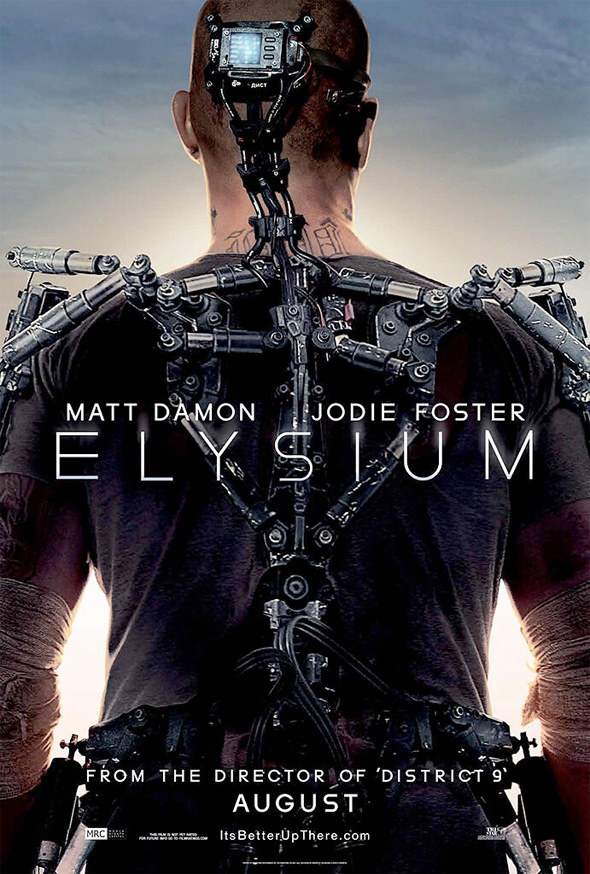 This was the opening weekend for the science fiction film Elysium. It took the number one spot at the box office, bringing in $30 million. Since it was first announced, it has been a much-anticipated vehicle for director Neill Blomkamp, who has a successful track record in his previous genre venture District 9 as an intelligent science fiction that incorporated social and cultural commentary.
This was the opening weekend for the science fiction film Elysium. It took the number one spot at the box office, bringing in $30 million. Since it was first announced, it has been a much-anticipated vehicle for director Neill Blomkamp, who has a successful track record in his previous genre venture District 9 as an intelligent science fiction that incorporated social and cultural commentary.
Story Summary
Elysium is a dystopian science fiction film set in the year 2154. The citizens of the planet are divided by class, with the vast majority still living on an Earth that resembles the current Majority World, worsened by overpopulation, crime, and environmental decay. The smaller remaining portion of humanity, the wealthiest and most influential, live in orbit on a posh space station called Elysium, where they have access to all the benefits that their social status provides, including advanced healthcare with the ability to cure even the most deadly of diseases and conditions. The political and business rulers of Elysium ensure that a strict separation is kept between the “haves and the have nots,” as citizenship is granted to a select few and confirmed by a bodily branding intertwined with the individual’s DNA. Those from the Earth who want to escape for a better life, and attempt to illegally emigrate to Elysium, are either quickly arrested and deported, or find their ship destroyed in space before it can reach its destination.
Having set the broader social context, the story then introduces two young children, Max (as an adult, played by Matt Damon) and Frey (as an adult, played by Alice Braga), who meet and develop a deep friendship while sharing their desires to one day make it to the Elysium they watch in orbit from their squalor on Earth. The two vow to be together forever, and Max pledges to Frey that one day he’ll help them both reach their utopian desires through Elysium. Fast forward to their adult lives, and Max is holding down a job manufacturing droids, and Frey hasn’t been seen for years, until Max has a violent encounter with police droids who break his arm in connection with his alleged parole violation. After seeking medical care Max connects once again with Frey who works in a hospital providing what meager medical care is possible on Earth without access to the technology of Elysium. Later, Max has a workplace accident, and is exposed to a lethal dose of radiation, with only five days left to live. The drive to survive leads him to pick up the criminal ways of his past, and he seeks out “Spider,” a character who steals Elysium citizens’ identification to support attempts at illegal immigration on the space station. Max agrees to one more job for Spider, and is fitted with an exoskeleton to strengthen his weakened body, and given the task of hijacking the high security computer technology of Elysium stored in the brain of one of its leading citizens and businessmen. Elysium is ultimately the story of a criminal turned savior who begins his journey in order to save his own life, but eventually fulfills his destiny in trying to provide a reboot of the entire social structure of humanity.
Commentary
This film is a worthy successor to Blomkamp’s previous film District 9. It combines science fiction storytelling and a believable script with good performances. It also incorporates a surprising amount of violence and gore, which takes things up a notch from what might be expected in a more traditional science fiction film. Elysium does involve problematic elements, such as one section of the film where Max is fitted with an exoskeleton to help him overcome the debilitating effects of radiation poisoning, and to improve his physical abilities as a mercenary. The technology is fused to his body, including his central nervous system via his skull and spine, not by medical technicians under clean conditions with medical instruments, but instead, by criminals working in the most unsanitary of environment with knives and drills. Not only is the surgery successful, but Max experiences no unsavory side effects from this most improbable of medical efforts.
Combining the good and the not so good, Elysium does all of this while also not giving in to spectacle over substance. In District 9, Blomkamp addressed racism and apartheid. With Elysium, the director taps into the modern zeitgeist and tackles a much broader range of social issues, including class warfare, wealth inequality and distribution, universal healthcare, illegal immigration, as well as workplace occupational safety, and current social debates over liberty and the “War on Terror.” It also incorporates posthumanism/transhumanism elements.
The major social focus of Elysium is that which played out in 2012 and continuing into the present, concerns of wealth inequality and the divide between the wealthy 1% and the lesser fortunate 99%. This was evident in the trailers for the film prior to its release, and although Matt Damon has said the film is not an allegory, and that Blomkamp did not want to beat viewers over the head with social critique, it is heavy handed and has led to division among reviewers. Progressives have tended to resonate with the film, as exemplified by Jonathan Kim in a piece for The Huffington Post, whereas conservatives, like Glenn Beck, have tended to decry the film as a “socialist thriller.” Despite the divide in interpretation of the film, it does provide a way for reflection on important topics. As with all good science fiction, it incorporates “cognitive estrangement” which gives the viewer the critical distance necessary to reflect in new ways on controversial material. Although Blomkamp is less than subtle in his social commentary (although no more so than 2011’s In Time), which compromises some of the effectiveness of the cognitive estrangement in this film, nevertheless, it does raise important issues for careful reflection across an ideological spectrum.
Consider a few examples.
Illegal immigration. Immigration comes to mind as three space ships make their way with non-citizens from the surface of the Earth to Elysium. Since the Earth-bound aspects of the film takes place in 2154 in Los Angeles, it is not surprising to find a largely Hispanic population, and Spanish as the dominant language spoken in the ghettos. As the ships filled with Hispanic illegal immigrants make their way toward Elysium, and later as one successfully lands and as its inhabitants flee and are tracked by infrared and other technology used by “Homeland Security” droids, our present political debates in the U.S. over immigration policy immediately comes to mind.
Universal healthcare. On Elysium, medical technology has advanced to the place where even cancer, leukemia, and a lethal does of radiation, can be overcome by advanced computer scanning and treatment. These scanning and healing beds are not found at special hospitals, but instead are featured within the homes of the wealthy. All one needs is citizenship, which provides access that the wealthy have, but the poor do not. The continued battles between segments of the legislative and executive branches of the U.S. government over the implementation of “Obamacare” and universal healthcare are echoed in this facet of Elysium.
Liberty and the “War on Terror.” During the film, Delacourt (Jodie Foster), who is tasked with overseeing the security of Elysium, makes the argument that extreme measures need to be taken to protect the “liberty” of the citizens of Elysium and the threat to their way of life, even to the point of the destruction rather than deportation of illegal immigrants. Such instances not only echo our cultural debates over concerns about the alleged erosion of personal liberties, but also about the types of actions and their extent that should be taken not only in regards to illegal immigration, but also the “War on Terror.”
System Reboot: The Interpretive Factor
As progressives, conservatives, moderates and everyone else in between continue the discussions and debates about these and other significant social issues featured in Elysium, serious questions arise about how the film’s ending and seeming answer to the problems are to be understood depending upon the context and frame of reference of interpretation.
On the one hand, Americans from the 99% are likely to interpret the film from an American context. At the conclusion of the film (spoiler alert!), Matt Damon’s head contains the stolen computer data and program that will reboot the entire system of Elysium, and make citizens of everyone, including the 99% on the Earth’s surface. Interpreted from this perspective and applied to America, the prescription for moving ahead entails rebooting America’s wealth distribution so that it is somehow made available more evenly among everyone, including access to the best healthcare available. Regardless of the sustainable economic considerations involved, this is a very American perspective on the issue, and one with which those in the rest of the world might well disagree.
Another interpretive possibility (and more likely one) is that Elysium is not understood as a tale of disparity between American citizens, but instead the world. From this perspective Elysium is America, and the 99% represent the rest of the world’s population, particularly the Majority World. This means that the system reboot does not merely involve a redistribution of America’s wealth among it’s citizens, but the wealth of America and other wealthy Western nations among the citizens of the world. Is this interpretation as appealing to Americans who might prefer a political and economic reboot limited to America on behalf of its citizenry?
How do we solve the challenges of the “haves and the have nots?” Is a system reboot the answer, financially and perhaps politically as well? If so, from what perspective to we aim at a reboot, nationally or internationally? Elysium raises important issues and provides a possible solution, but how that is interpreted and applied is as important as the challenges the reboot is designed to fix.
Present public discourse is polarized and divisive. Attempts at understanding the perspectives of those with whom we disagree are few and far between, especially sympathetic ones. But the challenges we face on a number of fronts are serious ones, both in terms of those in America, and those by citizens of other nations. Elysium continues in the tradition of intelligent science fiction past and present in providing commentary on contemporary social issues and challenging us to reflect on them self-critically. Whatever one’s perspective on Elysium, and regardless of where the reader falls on the political and ideological spectrum, perhaps the serious challenges we face might trump our usual divides so that we can enter into meaningful conversations and make the compromises necessary to forge real solutions to what ails us.








There are no responses yet